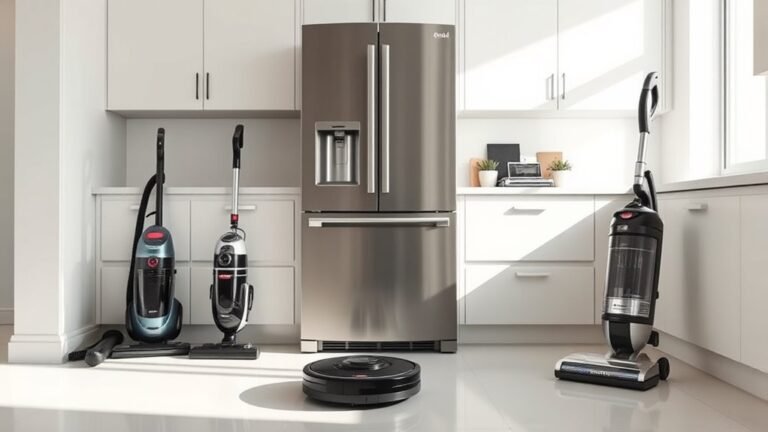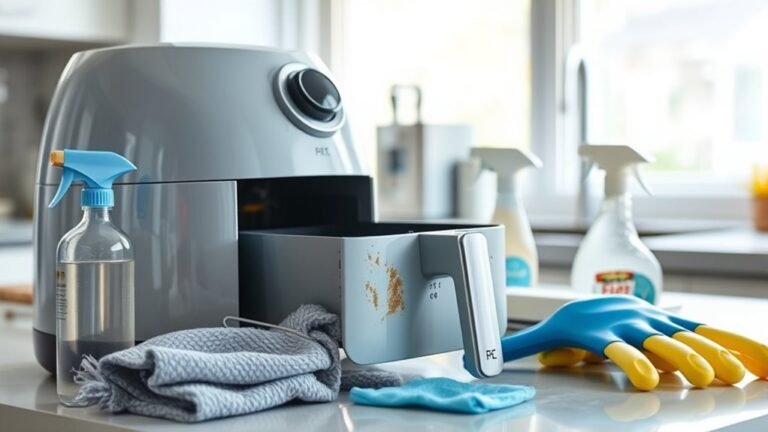Common Mistakes When Cleaning Oven
When cleaning your oven, avoid harsh chemicals that can damage surfaces or heating elements. Always remove racks to clean them separately and access corners better. Don’t forget to ventilate properly to prevent harmful fumes from building up. Use gentle scrubbing tools to protect finishes, and follow the manufacturer’s cleaning instructions closely to avoid corrosion or malfunction. Skipping regular cleaning leads to grease buildup that harms performance. Understanding these mistakes helps you maintain your oven’s efficiency and longevity.
Using Harsh Chemicals That Damage the Oven
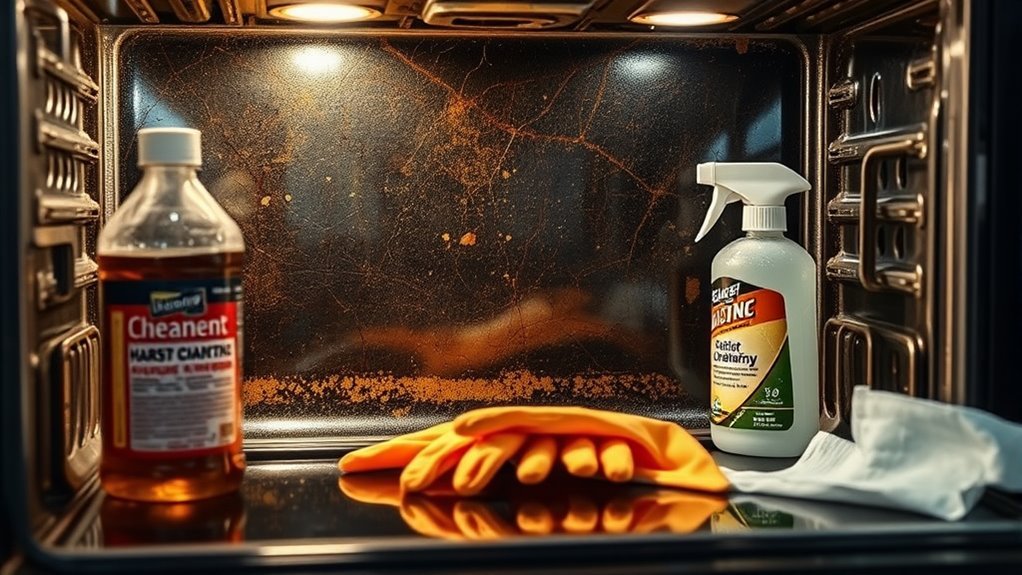
Although harsh chemicals might promise quick results, using them can actually damage your oven’s surfaces and components. You should prioritize chemical safety by carefully reading labels and avoiding corrosive products that can erode enamel or harm heating elements. Instead, consider eco friendly alternatives that clean effectively without compromising your oven’s integrity. Ingredients like baking soda, vinegar, and lemon juice provide a safer, non-toxic approach to removing grime and grease. These options not only protect you from harmful fumes but also reduce environmental impact, aligning with your desire for freedom from harsh chemicals. By choosing gentle, eco friendly methods, you maintain your oven’s longevity while ensuring a safer, healthier cleaning process. This methodical approach helps you clean thoroughly without risking damage or exposure to toxic substances. Additionally, using natural solutions for streak-free shine can enhance your cleaning routine while protecting your oven’s finish.
Forgetting to Remove Oven Racks Before Cleaning
One common oversight when cleaning your oven is forgetting to remove the racks beforehand. Skipping oven rack removal can hinder effective cleaning, trap residue, and potentially damage both the racks and oven interior. To maintain freedom from stubborn grime, consider these points:
Removing oven racks before cleaning prevents trapped residue and protects both racks and oven interior from damage.
- Oven racks clean better separately, allowing thorough scrubbing.
- Leaving racks inside limits access to oven corners.
- Cleaning frequency impacts ease; racks accumulate grease faster than the oven interior.
- Some oven cleaners can discolor or corrode racks if not removed.
- Removing racks prevents chemical residue from sticking to metal surfaces.
- For best results, soak oven racks monthly in warm, soapy water as part of regular oven maintenance.
Neglecting to Ventilate the Kitchen Properly
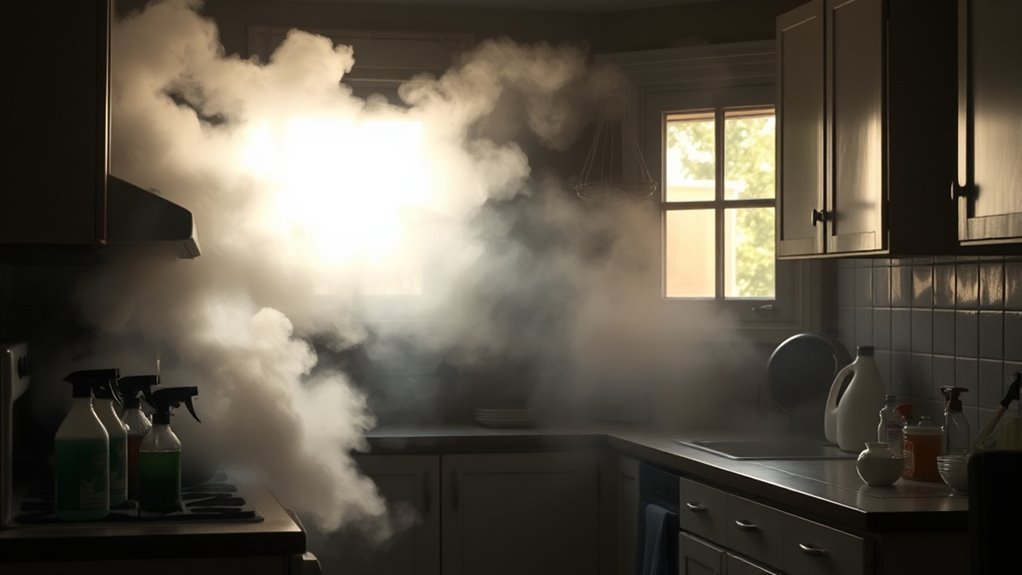
If you don’t ventilate your kitchen properly while cleaning the oven, fumes from cleaning agents can build up quickly, posing health risks and lingering odors. Ensuring proper kitchen airflow is essential for your safety and comfort. Open windows, run exhaust fans, and avoid sealing the space to prevent inhaling harmful chemicals. Follow these safety precautions to maintain fresh air and reduce exposure. Consider using protective gear such as masks to prevent inhaling airborne particles during cleaning.
| Ventilation Method | Benefit | Recommended Action |
|---|---|---|
| Open Windows | Fresh air circulation | Keep at least two windows open |
| Exhaust Fan | Removes fumes | Turn on high during cleaning |
| Door Ventilation | Enhances airflow | Keep kitchen door open |
| Air Purifier | Filters particles | Use if natural airflow is limited |
Scrubbing Too Aggressively and Scratching Surfaces
Many people make the mistake of scrubbing their oven surfaces too aggressively, which can cause scratches and damage the finish. To maintain your oven’s appearance and function, it’s essential to adopt proper scrubbing techniques that prioritize surface protection. Avoid harsh abrasives and excessive force. Instead, focus on gentle but effective cleaning methods.
Scrub your oven gently to protect its finish and avoid damage from harsh abrasives or excessive force.
Keep these tips in mind for safe scrubbing techniques:
- Use non-abrasive sponges or cloths
- Apply mild, oven-safe cleaners
- Test cleaning products on a small area first
- Avoid steel wool or rough brushes
- Rinse thoroughly to remove residue
Opting for gentle cleaning solutions like baking soda and vinegar can protect surfaces while effectively removing grime.
Ignoring Manufacturer’s Cleaning Instructions
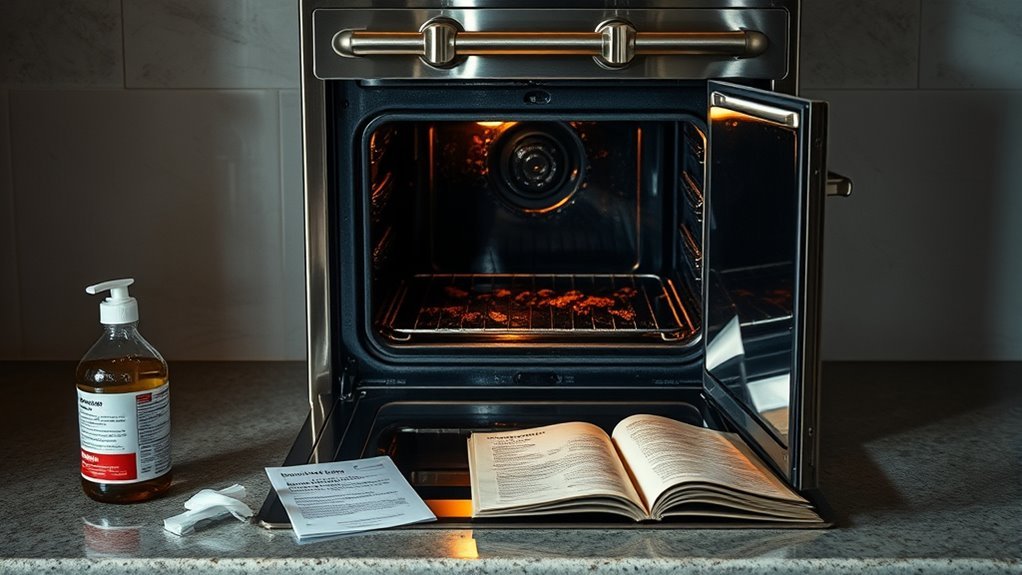
While using gentle scrubbing techniques helps protect your oven’s surfaces, following the manufacturer’s cleaning instructions guarantees you don’t unintentionally damage internal components or void warranties. Manufacturer guidelines specify not only approved cleaning products but also the recommended cleaning frequency tailored to your oven model. Ignoring these instructions can lead to corrosion, malfunction, or ineffective cleaning. For example, some ovens require specific cleaners or advise against abrasive materials. Others recommend cleaning intervals based on typical use to prevent build-up without overdoing it. By adhering strictly to these guidelines, you maintain your oven’s performance and longevity while preserving your freedom from costly repairs. Always consult the manual or manufacturer’s website before starting; this methodical approach assures safe, efficient cleaning aligned with your oven’s design parameters. Using cleaning solutions specifically designed for your appliance ensures optimal results without causing damage.
Skipping Regular Cleaning and Letting Grease Build Up
Neglecting regular oven cleaning allows grease and food residues to accumulate, creating stubborn buildup that’s harder to remove over time. Skipping a consistent cleaning schedule leads to grease accumulation, which not only affects your oven’s efficiency but also poses fire hazards. To maintain freedom from tough scrubbing sessions, stick to a methodical cleaning routine.
Consider these points:
- Grease buildup traps smoke, causing unpleasant odors.
- Hardened residues require stronger chemicals or intense scrubbing.
- Neglected ovens consume more energy due to inefficient heating.
- Regular cleaning extends the oven’s lifespan.
- A set cleaning schedule prevents grease from becoming unmanageable.
- Additionally, cleaning filters regularly helps prevent grease buildup and maintains kitchen freshness.
Frequently Asked Questions
How Often Should I Clean My Oven for Optimal Performance?
Ever wondered how often you should tackle oven cleaning for the best results? To maintain peak performance, you should set an oven cleaning frequency of every 3 to 6 months, depending on usage. Establishing an ideal cleaning schedule helps prevent buildup and guarantees your oven runs efficiently. If you cook daily, cleaning every 3 months is ideal; for occasional use, 6 months works well. This way, you keep your oven in top shape without hassle.
Can I Use Natural Ingredients Like Vinegar or Baking Soda to Clean My Oven?
Absolutely, you can use natural cleaners like vinegar and baking soda as effective cleaning alternatives for your oven. Simply sprinkle baking soda over the oven’s interior, spray with vinegar, and let it fizz for 15-20 minutes before scrubbing gently. These natural ingredients break down grime without harsh chemicals, giving you a safer, eco-friendly option. This method offers freedom from toxins while keeping your oven fresh and functional.
Is It Safe to Use a Steam Cleaner for Oven Cleaning?
Did you know steam cleaning can reduce grease by up to 90%? When considering steam cleaner safety for your oven, it’s generally safe if your model allows it—check the manual first. Steam cleaning effectiveness lies in its ability to loosen grime without harsh chemicals, giving you freedom from toxic residues. Just avoid using it on electrical parts or self-cleaning ovens. With care, steam cleaning can be a powerful, eco-friendly way to keep your oven spotless.
How Do I Clean the Oven Door Glass Effectively?
To clean your oven door glass effectively, start by removing loose debris with a damp cloth. Then, apply a mixture of baking soda and water, letting it sit for 15 minutes. Use a non-abrasive sponge to scrub gently, focusing on stubborn spots. Rinse with a clean, damp cloth to remove residue. These oven door cleaning techniques guarantee clarity without scratching, giving you freedom to maintain a spotless oven easily.
What Should I Do if My Oven Emits a Strange Smell After Cleaning?
If your oven emits a strange odor after cleaning, first confirm you’ve removed all cleaning residues. This smell often comes from leftover chemicals burning off. Ventilate the area by opening windows and running a fan. Double-check you followed proper cleaning precautions, like using oven-safe products and avoiding excess moisture. Running the oven at a low temperature for 15-20 minutes can help burn off any remaining odors safely.

